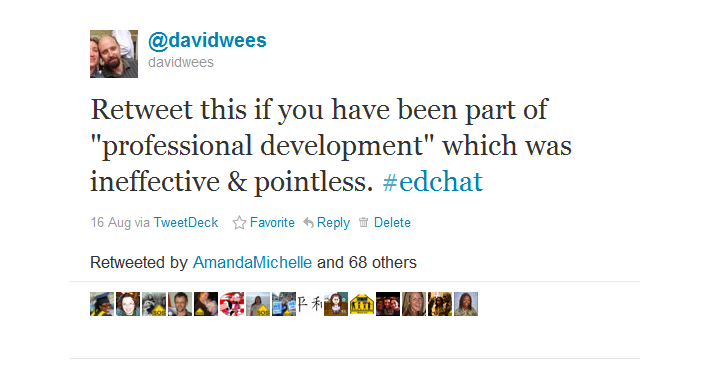I believe that social media has the potential to facilitate a transformation in education in a way that no other communication tool before it has.
First, social media allows teachers to learn about ideas outside of their school or school district. Too often we are isolated within our classrooms, within our schools, and within our school districts, and we make assumptions about how certain educational practices should be done. When we see other schools doing things differently, it makes us wonder how we could change or improve our own practices. While other broadcast mediums (such as print and television) have this capability, social media allows us to both find out about an alternative practice and discuss the details of implementing this practice directly with whomever has created it.
Professional learning for teachers is also changing. Educators can now use social media to connect with ideas any time, any place. The #edchat discussion that happens weekly on Twitter is more similar to an Edcamp than it is to a traditional conference. An enormous percentage of what teachers learn comes from informal settings, and social media can extend the times and places where this informal learning can take place.
Just like their students, educators also need to feel like part of a community, and in some schools, they may be too different from their peers to form emotional attachments within their school. Social media allows these educators to find a peer group outside of their school with whom they can connect and form communities of care. Educators who feel like they are part of a community have greater morale, and are better able to cope with the stress their jobs entail.
I have also found that social media both exposes educators to the big ideas of education and the "what can I do on Monday" type of resource. It is important to have both – the first because the big ideas of education are what drive change, and the second because having resources available to use on a daily basis give you time to think about the big ideas.
Social media allows educators to, as a network, collaborate to solve problems that none of them could individually solve. I recently started a presentation on formative assessment. I seeded it with 20 examples of formative assessment, and then sent a link to my network of educators asking for more examples. The presentation is now up to 55 examples, and I could not have come up with all of those examples myself.
There are also some problems (or maybe they are more accurately named opportunities?) with social media.
I have seen many examples (and participated in many examples) of miscommunication that occurs because of the general terseness of the medium, and sometimes because of a fundamental disagreement about what the language being used means. I had a half-an-hour-long argument with another educator which only ended when I realized that she was using a completely different definition of learning than me. It is important to take the time to clarify language, and where necessary, link to less concise explanations of what we mean. This is one reason why I think that every educator who participates in social media should have some web-space available to which they can link when necessary.
Social media also favors people who are already well-connected. I am able to use social media as an especially effective means of collaboration because I have many educators in my network already. For people who are just getting started with Twitter, they may see it as more of a means to follow people who broadcast, rather than as much of a tool for connecting with and discussing educational ideas with other educators. As someone who is well-connected, I do my best to share some of the good projects and ideas I see from people within my network, so that my network can be at least in part a shared resource.
It is also well-known that people tend to repeat opinions that are popular more than opinions held by a minority. We naturally have a desire to be part of a group, and one consequence is that we can sometimes fall into the trap of groupthink. This phenomena also happens at the school level! It is therefore important that every network should contain some dissenters, some people who are willing to go against the crowd. We also need to think about our reasons for believing something to be true – do we really believe it, do we have evidence to support our belief, or are we just following the crowd?
Social media by itself will not change education – that responsibility lies with the people who use it, but change starts with desire, and social media can provide information which may lead to a desire to change.
